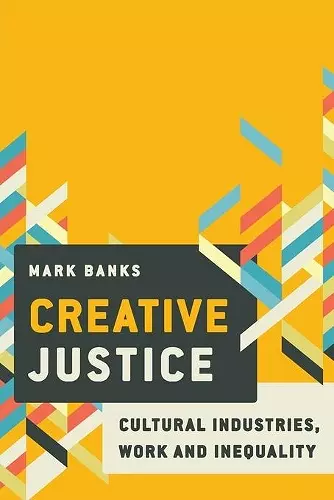Creative Justice
Cultural Industries, Work and Inequality
Format:Paperback
Publisher:Rowman & Littlefield International
Published:30th Jan '17
Currently unavailable, and unfortunately no date known when it will be back
This paperback is available in another edition too:
- Hardback£127.00(9781786601285)

This insightful exploration addresses inequality in cultural industries while seeking solutions for achieving fairer systems. Creative Justice offers a critical perspective on the creative workforce.
In Creative Justice, the author delves into the pressing issues of inequality and injustice prevalent in the cultural industries and workplaces. The book begins with a commitment to 'do justice' to the various forms of creative expression produced by artists, musicians, designers, and other symbol-makers. It emphasizes the importance of recognizing these works as meaningful goods, possessing their own objective qualities that transcend mere economic value. By appreciating the intrinsic worth of cultural products, the narrative sets the stage for a broader discussion about the nature of cultural labor itself.
Beyond its celebration of creativity, Creative Justice also confronts the stark realities of injustice within the arts. The text critically examines the structures of arts education and cultural policy, highlighting the inequities that plague cultural work. In a landscape where low pay and wage disparities are commonplace, the author raises questions about the accessibility of prestigious cultural institutions and the opportunities available to individuals from diverse social backgrounds. How can ordinary people achieve their own version of 'creative justice' in such an environment?
Targeted at students and scholars across various disciplines, including Sociology, Media and Communication, Cultural Studies, Critical Management Studies, and Human Geography, Creative Justice not only analyzes the evidence of these systemic issues but also proposes potential solutions. The book serves as a call to action for creating fairer and more equitable systems within the arts and cultural sectors.
Banks demolishes the "creative industries" hype about the new meritocracy of cultural work. Balancing data analysis with social theory, his valuable study shows that, after a brief interregnum when absolute beginners were able to scale the heights, the cultural sector is once again becoming a domain of class consolidation. -- Andrew Ross, Professor of Social and Cultural Analysis, New York University, USA; author of Nice Work If You Can Get It: Life and Labor in Precarious Times
In recent years, theoretically informed and normatively committed critique has been in short supply in the cultural field. Consultants’ reports and the dreary output of policy wonks have conquered the imaginative space. In this book, drawing on several critical traditions, Mark Banks has broadened the scope of debate, taking culture ‘in itself’ seriously. By daringly constituting ‘creative justice’ as an object and vantage-point he skewers current delusions about the nature of cultural work and education and proposes remedies to present inequalities. But will he be heeded? -- Philip Schlesinger, Professor in Cultural Policy, University of Glasgow
Mark Banks makes music out of the social necessity of normative judgement. Creative Justice starts by “paying respect” to the cultural object and subject in normative reasoning and action. How do we advance it? By seeking parity of cultural participation, robust economic redistribution of cultural opportunity and enforcement of fair pay, but especially by facing the paramount responsibility to reduce harm in a world where horrific harms of hate and extreme thought threaten to engulf popular reason. Yes, justice can be done. And it may be creative. -- Catherine Murray, Professor of Gender, Sexuality and Women’s Studies at Simon Fraser University, Vancouver, Canada
An intriguing exploration of the difficulty of evaluating cultural work and cultural objects. In this excellent book, Mark Banks carefully unpicks the theoretical accounts that reduce artistic value to either a social construction or a crude economic calculation. Instead, he seeks to reclaim gradations of 'good' in both practices and products, while at the same time exposing the distortions within the contemporary cultural industries that result from increasing social inequality. -- Stephanie Taylor, The Open University
ISBN: 9781786601292
Dimensions: 230mm x 150mm x 14mm
Weight: 304g
200 pages